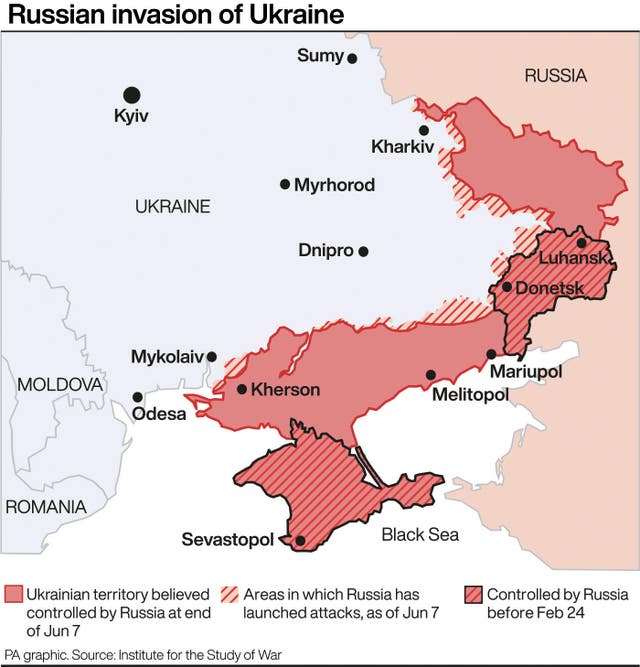Russia and Turkey have voiced support for the creation of a safe maritime corridor in the Black Sea so Ukraine can export grain to global markets amid an escalating world food crisis.
But Russia demanded that the Black Sea be demined and Turkey said allowing the Ukraine exports should be accompanied by easing of western sanctions against Russia.
Turkish foreign minister Mevlut Cavusoglu hosted his Russian counterpart Sergey Lavrov in Ankara for discussions focused on a UN proposal to free Ukraine’s Black Sea ports and allow 22 million tons of grain sitting in silos to be shipped out.

The two allies appeared eager to dictate the terms of Ukraine’s exports — which have been strongly affected by Russia’s invasion of Ukraine — and cement further control over the Black Sea. Ukraine was not invited to the talks.
Ukraine is one of the world’s largest exporters of wheat, corn and sunflower oil, but the war and a Russian blockade of its ports have halted much of that flow, endangering food supplies to many developing countries. Many of these ports are now also heavily mined.
Russia has urged Ukraine to remove mines from the area near the Black Sea port of Odesa to allow safe grain exports. Russian president Vladimir Putin has vowed that Russia will not use the demined corridors to launch an attack on the key Ukrainian port of Odesa — but Mr Putin also insisted earlier this year that he had no plans to invade Ukraine.
Mr Lavrov said on Wednesday that Russia was ready to formalise that guarantee for Odesa. The Russian envoy promised that his country would not “abuse” its naval advantage if Ukraine’s ports were demined and would “take all necessary steps to ensure that the ships can leave there freely”.

Moscow also insisted on its right to check the incoming vessels to be loaded with grain to make sure they did not carry weapons into Ukraine.
Ukraine, which was not represented at the Ankara meeting, said the Russian promise not to use safe shipping corridors to attack Odesa was not credible. The head of Ukraine’s grain traders group has also scoffed at Turkey’s effort to negotiate a deal with Russia to allow Ukrainian grain exports to resume, saying that Ankara is not powerful enough to act as a guarantor against Russia.
“Turkey doesn’t have enough power in the Black Sea to guarantee security of cargo and Ukrainian ports,” Ukrainian Grain Union chief Serhiy Ivashchenko said on Wednesday.
He also said it would take three to four months to remove sea mines, and that it was the Russians who had mined the area.

Both Russia and Turkey would benefit from the export plan. The same corridor would also allow Russia to safely export its food and fertiliser. Turkey says it would facilitate and protect the transport of the grain in the Black Sea — a move cutting out other possible shippers.
“We find this plan reasonable and see it as a feasible one,” Mr Cavusoglu told a joint news conference with Mr Lavrov.
But the scheme would require negotiations between Moscow and Kyiv, he added.
The Turkish minister also backed easing western sanctions against Russia for its invasion of Ukraine if it participated in the plan, saying that seemed “quite legitimate”.

“If the whole world is in need of the products to be exported by Ukraine and the Russian Federation, then a method needs to be established”, he said, adding that he hoped “technical preparations” could be made “as soon as possible”.
While grain exports are exempt from western sanctions, Russia claims that sanctions on its shipping make it impossible to ship its grain to global markets. European Union officials emphasised again that the bloc did not impose sanctions on food.
“The Kremlin is weaponising food supplies and surrounding their actions with a web of lies, Soviet-style,” European Council president Charles Michel told the European Parliament on Wednesday.
Ukrainian president Volodymyr Zelensky and Turkish president Recep Tayyip Erdogan discussed the creation of a safe sea corridor last week, the Ukrainian foreign ministry said on Tuesday. The ministry also called for security guarantees, such as a supply of weapons to defend against maritime threats and the participation of Nato ships in the Black Sea.




Comments: Our rules
We want our comments to be a lively and valuable part of our community - a place where readers can debate and engage with the most important local issues. The ability to comment on our stories is a privilege, not a right, however, and that privilege may be withdrawn if it is abused or misused.
Please report any comments that break our rules.
Read the rules hereLast Updated:
Report this comment Cancel